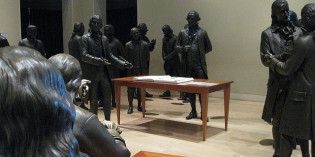Crowdsourcing the Constitution

Constitutional amendments by popular initiative: lessons from Croatia’s constitutional outlawing of gay marriage
On 3rd December 2013, the Croatian public voted in support of adding a provision to their constitution which defines marriage as “a union between a man and a woman”. Croatians effectively voted to constitutionally entrench a ban on gay marriage. The prohibition of same sex marriage in the constitution is in itself is not particularly […]

Crowdsourcing a British constitution: lessons from Iceland
In the wake of the financial crisis, Iceland was seen by many as a beacon of democracy in its attempt to create a new constitution. Activist and author, Smári McCarthy argues that although some may have seen Iceland as a utopia, the efforts put into creating the new constitution have largely been squandered as those responsible for […]

The British sense of reserve has much to commend it, but it would be difficult to codify in a constitution
The separation of powers is a fundamental feature of many written constitutions, but few of them incorporate the supportive principle of institutional self-restraint. In this post, Dr Aileen Kavanagh discusses how the British sense of reserve might inform such a principle and considers the implications of including this value in a proposed UK written constitution. Similar PostsInterview: Richard […]

Interview: Richard Gordon on the need for a written constitution
Democratic Audit features short audio interviews with leading experts on the state of democracy and human rights. As part of our Constitution UK project, Richard Berry spoke to Richard Gordon QC, who recently published a draft constitution. Listen to the interview here, and read Richard Gordon’s explanation of why the UK needs to make the shift from parliamentary […]

Crowdsourcing the UK’s constitution: why the status quo is not an option
LSE’s Institute of Public Affairs and Department of Law, and Democratic Audit have recently teamed up for a project which will crowdsource a UK written constitution. In advance of project launch event, Jack Bailey of the LSE Institute of Public Affairs and Sean Kippin of Democratic Audit explain why the current state of affairs is untenable, and how […]


 Democratic Audit's core funding is provided by the Joseph Rowntree Charitable Trust. Additional funding is provided by the London School of Economics.
Democratic Audit's core funding is provided by the Joseph Rowntree Charitable Trust. Additional funding is provided by the London School of Economics.